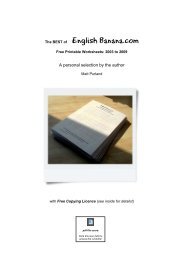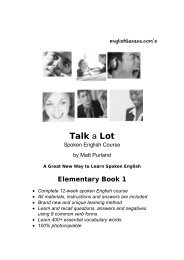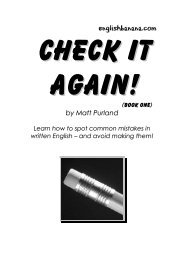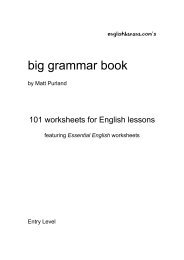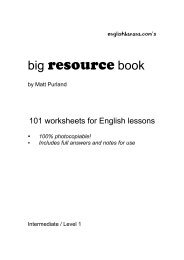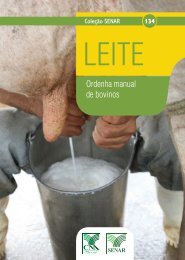activiTy
Create successful ePaper yourself
Turn your PDF publications into a flip-book with our unique Google optimized e-Paper software.
English Banana.com<br />
Games for the Classroom<br />
tour of their labelled items, explaining what each object is.<br />
What Is It...?<br />
Get the class into two teams. Take one student from each class out of the room, give them<br />
both a whiteboard pen (or chalk stick, or marker, etc.) and give them the name of a book, TV<br />
show (for example ‘The A-Team’), film, or famous person. They have to run back into the<br />
room and draw clues on the board, while the other students try to guess the name that they<br />
have been given. They are not allowed to write any words. Students love this game, and it<br />
gets rather loud as the students get more involved. Make sure your students are aware of the<br />
cultural references that you want to give them. The game can be played just as well using<br />
vocab sets such as, furniture, food, animals, and so on.<br />
What Am I...?<br />
For this game you will need to put a sticker on the back of each student, with a noun written<br />
on it, for example, apple, chair, Wednesday, bathroom, or bottle of tomato ketchup. The<br />
students have to mingle with one another and ask questions to find out ‘What am I...?’<br />
Students can only reply with either ‘Yes’ or ‘No’. Once they have found out what they are,<br />
they report to you and tell you what they are and what questions they had to ask in order to<br />
work it out. They could then go and write down the different questions. This also works when<br />
you use celebrity names instead of nouns – as long as all the students are aware of exactly<br />
who all the celebrities are. You could also use specific vocab sets such as countries (‘Am I<br />
north of the equator, or south?’), or clothes (‘Am I worn on the head?’) The sky’s the limit!<br />
Good for question forms and to get students talking.<br />
Grammar Skills<br />
A Capital Game<br />
Write a load of nouns on the board, both common nouns and proper nouns, but don’t use<br />
capital letters. Vary the list of words to suit the level of your group, so for an elementary class<br />
you could write something like: ‘table, usa, book, house, garden, england, philip, the times,<br />
shirt, ice cream...’ and so on. The students split into two groups and compete to be the first to<br />
write the list of words again, but this time putting capital letters on the proper nouns (in this<br />
example, ‘USA, England, Philip, The Times’).<br />
Interesting Articles<br />
Similar to ‘A Capital Game’, this involves writing plenty of different nouns on the board and<br />
getting the class – in two teams – to discuss and write down whether there should be ‘a’ or<br />
‘an’ before each word. This is a quick and easy game – intended for elementary students<br />
really – that allows the students to identify and practise the grammar rule for indefinite<br />
articles. Make sure you throw a few proper nouns into the mix too, just to confuse them!<br />
The Instant Story Generator<br />
The whole group sits in a circle and decides on a few story keywords, for example, a place, a<br />
man’s name, a woman’s name, an object, and so on. Tell the students they are going to tell a<br />
story as a group. Each student can only contribute one word at a time, before the story<br />
For more fun worksheets, games and quizzes log onto www.englishbanana.com now!<br />
big activity book © English Banana 2004 90.




